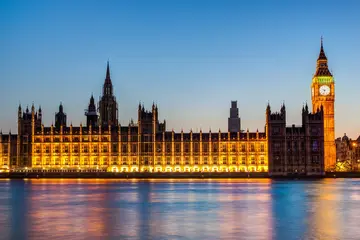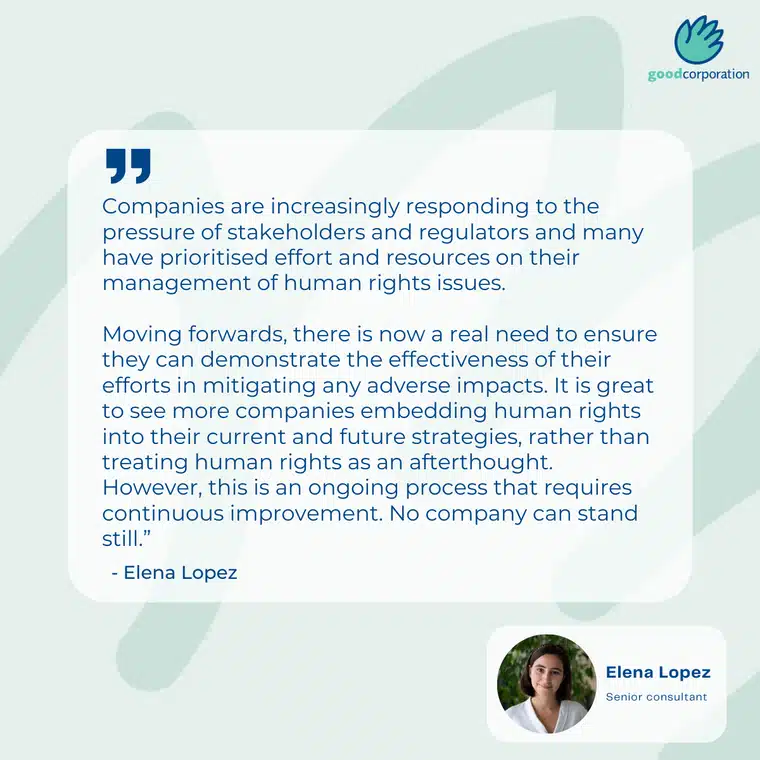Winter Update 2024
Newsletters | read time: 4 min
Published: 13 February 2024

Key trends in ESG and corporate sustainability
ESG and sustainability issues dominated the corporate agenda during 2023. This was driven by a number of factors, including increased regulatory scrutiny, emerging legislation and growing consumer demands for meaningful sustainability. As such, many businesses have been seeking to identify and manage their material ESG and sustainability risks, asking how this will develop in the coming year and what factors are at play that looks set to influence the direction of travel.
This blog by GoodCorporation’s Managing Director, Leo Martin, sheds some light on these diverse and challenging issues. Delving into the key trends that we can expect from ESG and corporate sustainability this coming year, it explores the challenges that might arise, as well as what businesses can do to get ahead of the curve.
Click the link below to read the article in full, and for more information on our ESG services, visit our dedicated webpage or contact us to speak to a member of our ESG team.
Planning for the EU CS3D: What Businesses Need to Do Now to Prepare

As businesses increasingly focus on identifying and mitigating human rights and environmental impacts, the European Commission’s introduction of the Corporate Sustainability Due Diligence Directive (CS3D) marks a pivotal step.
The directive aims to raise the bar and standardise due diligence practices, requiring companies to assess and address their impacts on human rights and the environment throughout their operations and business relationships.
With potentially over 12,000 EU and non-EU companies in scope, our latest blog explores the directive’s key elements, compliance challenges, and potential liabilities.
We explore the steps businesses can take now to prepare for these changes and embed sustainability into their practices. Read the full blog on our website for an in-depth understanding of the CS3D and its implications for corporate sustainability.
House of Lords debate: How will the Economic Crime and Corporate Transparency Act work in practice?

GoodCorporation’s debate on the ECCT Act explored the significance of this new piece of legislation. While there remains some concern that the Act applies only to a relatively small number of large organisations, it is anticipated that these companies will need assurances that fraudulent activity is not being undertaken on their behalf by those in their supply chain. As such, we may see the legislation having an impact beyond the 0.5% of businesses currently in scope.
It was also clear from our discussion that the range of specified fraud offences will mean that businesses need to consider fraud through a much wider lens. For many, this will mean starting with a risk assessment of a wide range of controls to identify whether they might be exposed, focusing on possible fraudulent behaviours rather than just the risk of being defrauded. The expansion of the identification principle may also make it easier for compliance teams to convince senior leadership of the need to allocate the necessary resources to put reasonable procedures in place. Learn more by reading a summary of the debate notes below.
Paris debate: Exploring Human rights in the value chain
This event, hosted by our Paris office, spurred thought-provoking discussions on human rights risks and impacts in the value chain. It brought forward a range of perspectives on how businesses approach human rights risk-mapping and the tools needed to reduce human rights abuses in their supply-chain.
From this discussion, it is evident that companies will need to bolster their due diligence procedures to align with emerging legislation.
To find out more, read the summary of the discussion (in French) below.

COP28 and the challenges it poses for businesses
Taking place between the 30th of November and 13th of December, COP28 saw 198 global parties gathering together for two weeks to assess progress on the Paris Agreement and determine objectives and solutions to tackle climate change and its effects.
This article delves into the challenges this poses and the issues debated. It explains the importance of organisations taking action to drive positive environmental change, outlining the various steps that can be taken to achieve this. Find out more below.

How to develop an effective environmental strategy
A global push towards sustainability and responsible business practices, paired with the urgency of the climate crisis, has meant that businesses are being forced to address their environmental impacts head on – but this is often easier said than done.
Our blog ‘Building an effective environmental strategy’ summarises the complexities that many companies face and the strategies that can be deployed to manage environmental risks and impacts successfully. Read more by clicking the button below.

Why every business needs a materiality assessment.
Companies are facing increasing pressure to both understand and mitigate their environmental, social and governance impacts – yet it can often be difficult to know where to start.
A materiality assessment provides the answer to this, allowing organisations to identify the ESG considerations that most directly affect them so that effective plans can be put in place.
Learn more about materiality assessments, why they are important and how they can be developed by clicking the button below.
Read more
Read more
Read more
Read more
International Human Rights Day
To mark the 75th anniversary of International Human Rights Day, we asked our Senior Consultant, Elena Lopez, to share her thoughts on the place of Human Rights in today’s business landscape.

Follow us on LinkedIn to stay up to date with what our team has to say and be the first to hear about our latest news and insights, including our most recent House of Lords debate on the CS3D.
work with us
